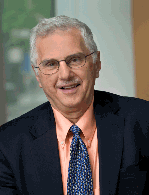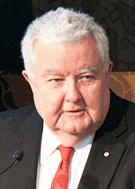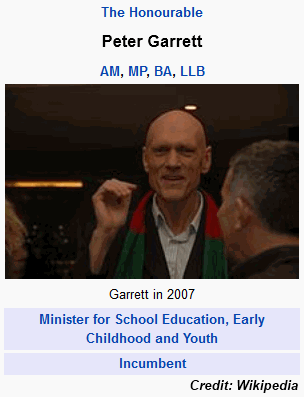|
News & Views item - December 2012 |
![]() Australia's Chief Scientist and Science's Editor in Chief on Teaching
Science. (December 16, 2012)
Australia's Chief Scientist and Science's Editor in Chief on Teaching
Science. (December 16, 2012)
This past November 29 Australia's Chief Scientist, Professor Ian Chubb (left),
addressed the annual conference of the science teachers' association of
 Victoria
while on December 7 and December 14 the journal Science published
consecutive editorials by its editor in chief, Bruce Alberts (right) on the "Failure of
Skin-Deep Learning" and "Mobilizing Scientific Societies".
Victoria
while on December 7 and December 14 the journal Science published
consecutive editorials by its editor in chief, Bruce Alberts (right) on the "Failure of
Skin-Deep Learning" and "Mobilizing Scientific Societies".
Professor Chubb while being careful not to step too firmly on the toes of his audience left little doubt that significant improvement in the teaching of science and mathematics in Australia was overdue. Professor Alberts also addressed problems of teaching science and maths (in the United States) but the two emphasised comparable problems while taking somewhat different perspectives. Both, however, called for their nations' scientists and mathematicians to be more active in working with their nations' primary and secondary school systems, and that the quality of teachers was of paramount importance.
Professor Chubb told the teachers: "...we have an issue. Young people are not studying these disciplines [science, technology, engineering, mathematics; STEM] in the numbers we need." and noted that his survey of "Year 11 and Year 12 students... indicated a fairly low understanding of how valuable science is." And this was followed by reference to "consultation we undertook to try and understand the reasons behind the decrease [in student interest in STEM which] allowed us to hear some important messages:
...inspirational teaching is seen as the key - both to the quality of our science education system, but just as importantly to raising student interest to more acceptable levels. Inspiring teachers will generally be those who are confident that they know their subject well, and can transmit that confidence, and their passion, into the classroom.
It is time to re-think how we prepare our teachers and how we support them:
support to strengthen their content knowledge, to maintain it at contemporary
levels and to instil the confidence to deliver the curriculum in interesting and
novel ways. The other key message was that the way we teach science, especially
the techniques we use, needs to change.
...many students said they found the way science was being taught to them
was too didactic, even boring... and practical classes were largely about
recipes or watching teachers following recipes, with little time for reflection.
The most common suggestion they provided for improving science classes was to
make those classes more interactive by
including more investigations, excursions, practical lessons or class
discussions.
Professor Alberts focused on an area almost untouched by Professor Chubb: "...the most meaningful learning takes place when students are challenged to address an issue in depth, which can only be done for a relatively small number of topics in any school year, but the traditional process of setting standards tends to promote a superficial “comprehensive coverage” of a field... leaving little room for in-depth learning. The curricula and textbooks that result are skin-deep and severely flawed."
He goes on to ask rhetorically: "How might we instead give schoolchildren the gift of experiencing the profound joys of science, or history, or literature?"
...we will need to abandon the one-size-fits-all textbooks used in schools in favor of a large set of much shorter curriculum units, each designed to facilitate the active exploration of one important topic in depth for a month or so. Importantly, the teachers in each school district should be empowered to cover only a fraction of the topics available for their grade level... the goal of each unit should be to challenge students to explore one narrow topic deeply. To this end, it will be important to avoid the fatally flawed, state-based textbook-adoption process.
In Professor Albert's view the "skin-deep approach to science learning" is 1) disastrous having "long-lasting effect on the attitudes of students toward science" yet 2) "proven highly resistant to change".

And the cause for the malaise: "...state-based textbook adoption policies, high-stakes examinations, and—inadvertently—by a scientific community that largely fails to understand teachers' needs."
As an object lesson Professor Alberts cites the: "700-page life science textbook for 12-year-olds selected by the state of California (with a glossary of 500 words) [which] never challenges students to consider the fascinating question of what cells must do to produce an embryo, focusing instead on introducing them to many hundreds of dry “scientific” terms and a multitude of associations to memorize."
In its place are badly needed: "...materials for teachers that guide students to confront a phenomenon such as embryo development and then, working in small groups with skilful coaching, to imagine potential ways to explain it... To facilitate such teaching, scientists will need to work in close partnership with outstanding teachers and other education experts... to develop new, validated, Web-based curricula that address the critical national (and international) need for inspiring, in-depth lessons. I propose that a set of scientific societies in different disciplines (covering biology, chemistry, physics, earth, and space sciences) be recruited for the above validation purposes."
From an Australian viewpoint, just what percentage of our primary and secondary science and maths teachers would qualify to undertake "in depth teaching". Perhaps we ought to ask if Professor Chubb would have been game to take up and promote Science's editor in chief's challenge before the Victorian science teachers.
And what would Peter Garrett, Minister for School Education, Early Childhood and Youth, have to say regarding Professor Alberts' suggestions for reform, let alone undertake trying to begin their implementation say as experimental pilot classes.
Or in fact are they seen as an unnecessary and impossible dream by someone not in touch with the Realpolitik of STEM education?